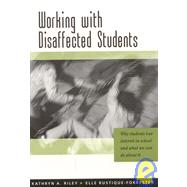Working with Disaffected Students : Why Students Lose Interest in School and What We Can Do about It
, by Kathryn A Riley- ISBN: 9780761940784 | 0761940782
- Cover: Paperback
- Copyright: 10/4/2002
'The book stresses the importance of early (and real) inter-agency co-operation, and of good initial and on-going teacher training' - Michael Duffy, The Times Educational Supplement This accessible book is about pupil disaffection. It tackles some of the issues, which confront policy makers and practitioners in many countries and contexts. Education has become a political priority for many governments, and many have sought to tackle the issues of underachievement and failure. But if education is a political priority, why aren't school days 'the best days of your life'? Why are so many students - and their teachers - unhappy with their lot? Most children start school at five, or thereabouts, with enthusiasm and curiosity. Most parents want the best for their children. Most teachers enter the teaching profession because they are motivated by enthusiasm for their subject, or by a commitment to support children's learning. Most teachers who become head teachers do so because they want to make a difference to young people's lives. For many teachers and their pupils, education is a rewarding experience. But what happens over the years to lead to disaffection in a sizeable minority? Why does the partnership between schools and families succeed for some, but fall apart for others? Why do some young people reject school and become excluded from learning? What forces the different 'camps' to blame each other ? International studies have shown that education attainment at age 16 is the most important predictor of future participation in learning, and of labour market opportunities. Young people with no qualifications are between two and three times more likely to be unemployed as their peers, and to be excluded from society. They become disenfranchised by their lack of educational opportunities. This book is more than another tale of pupil disengagement. From talking to parents, pupils and teachers, the authors provide some answers to the questions: - What can be done to realize the high expectations that are shared by parents, pupils and teachers alike when children first start their schooling? - What can be done to make a difference?







